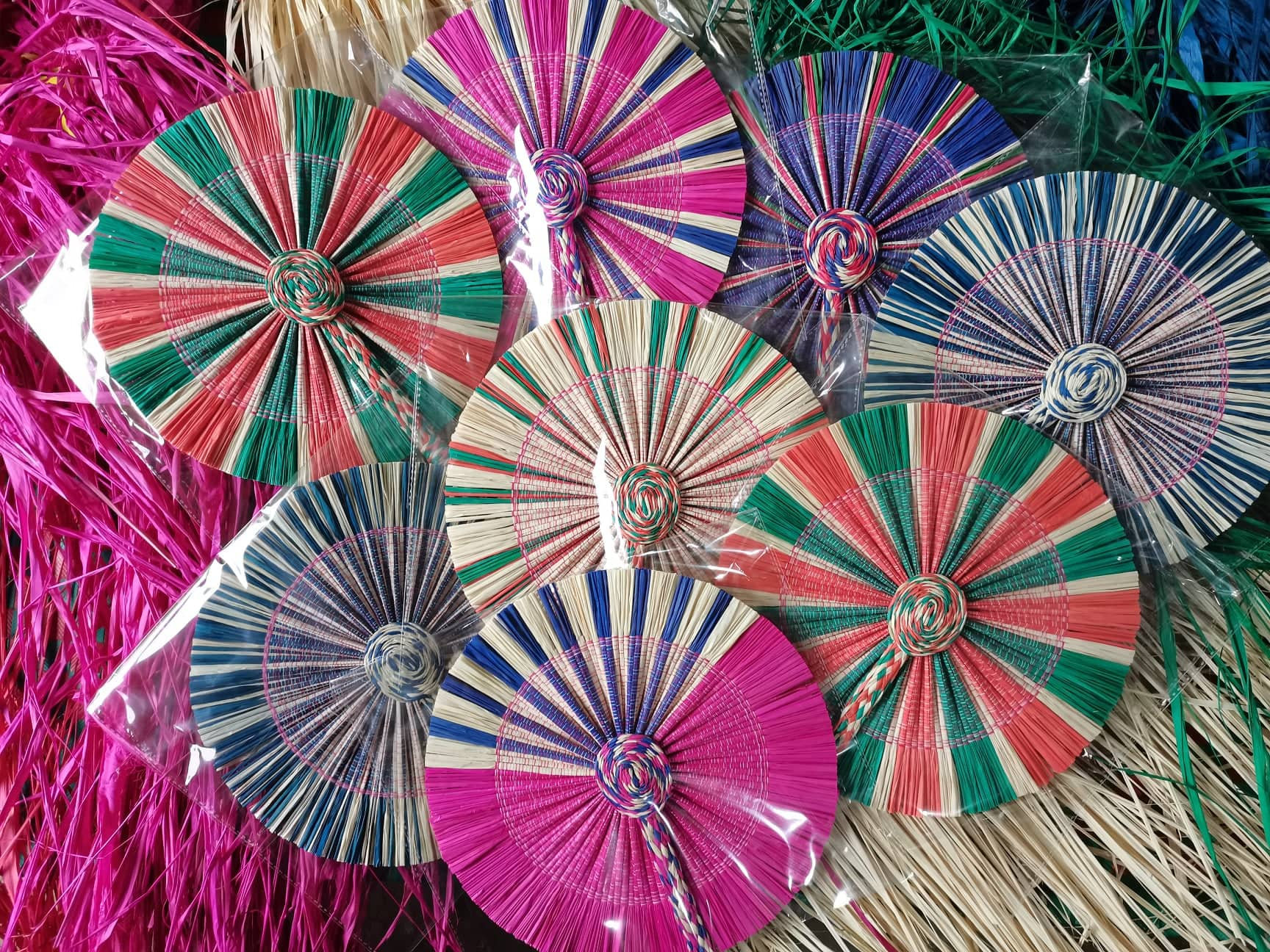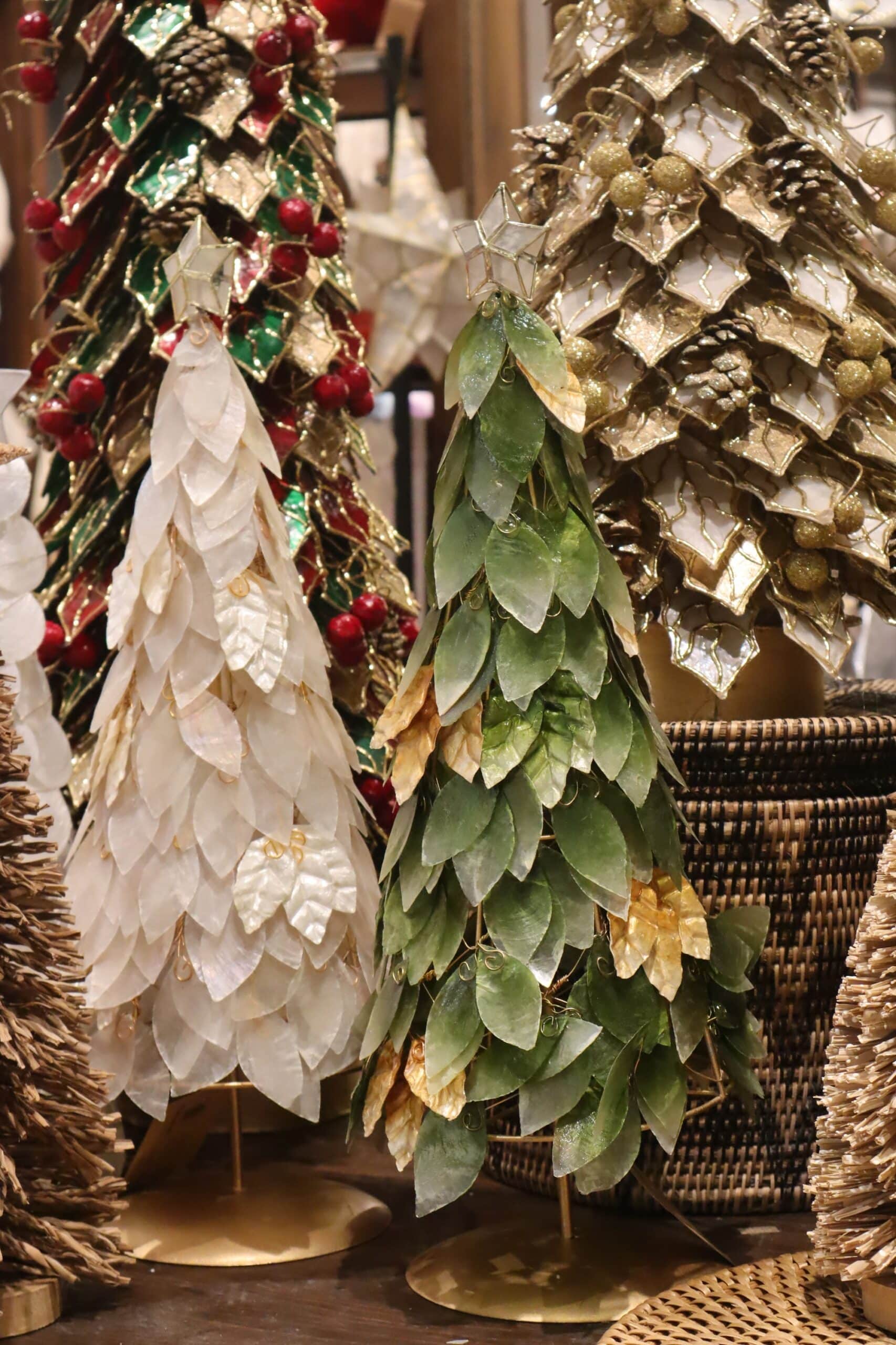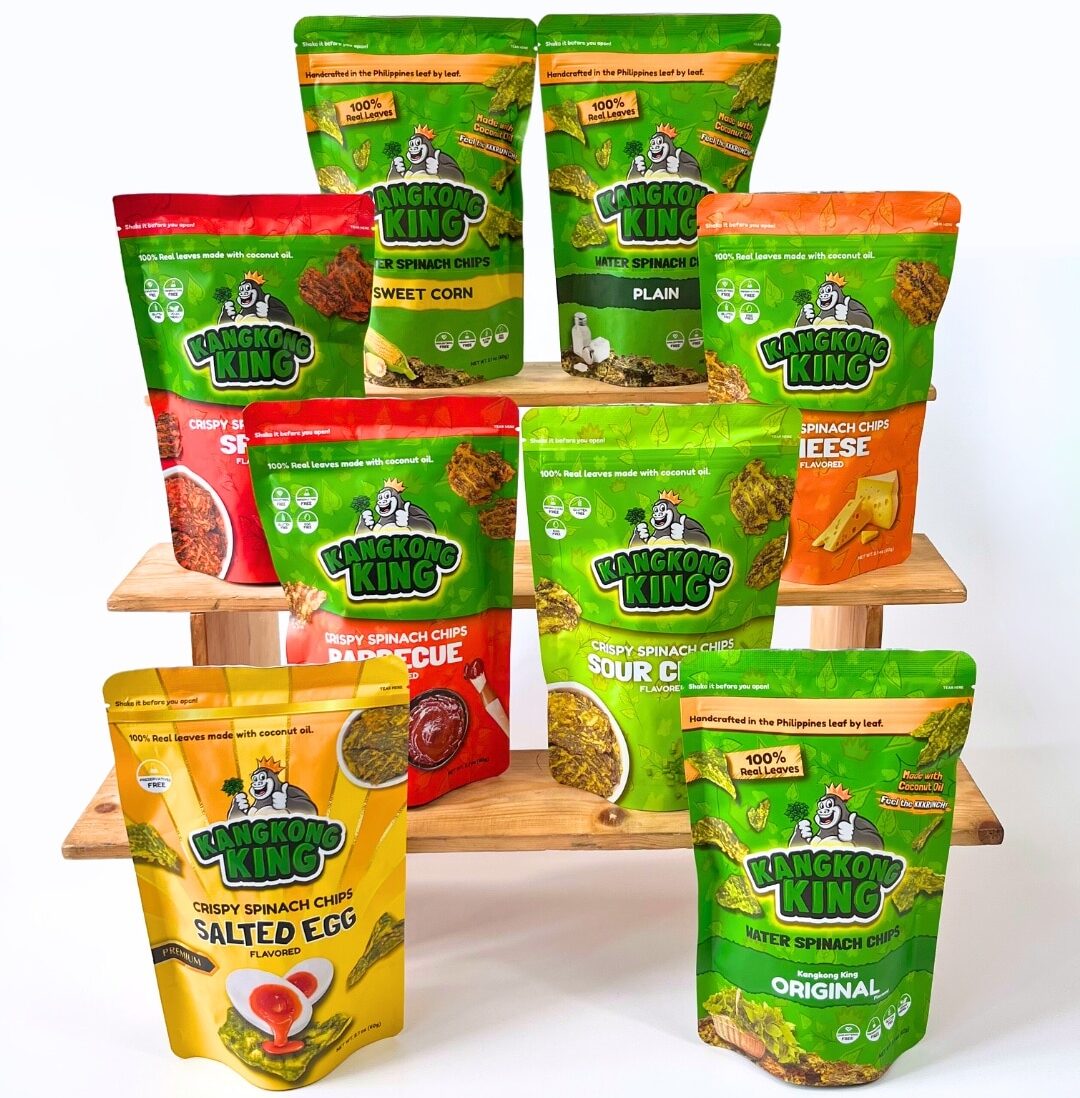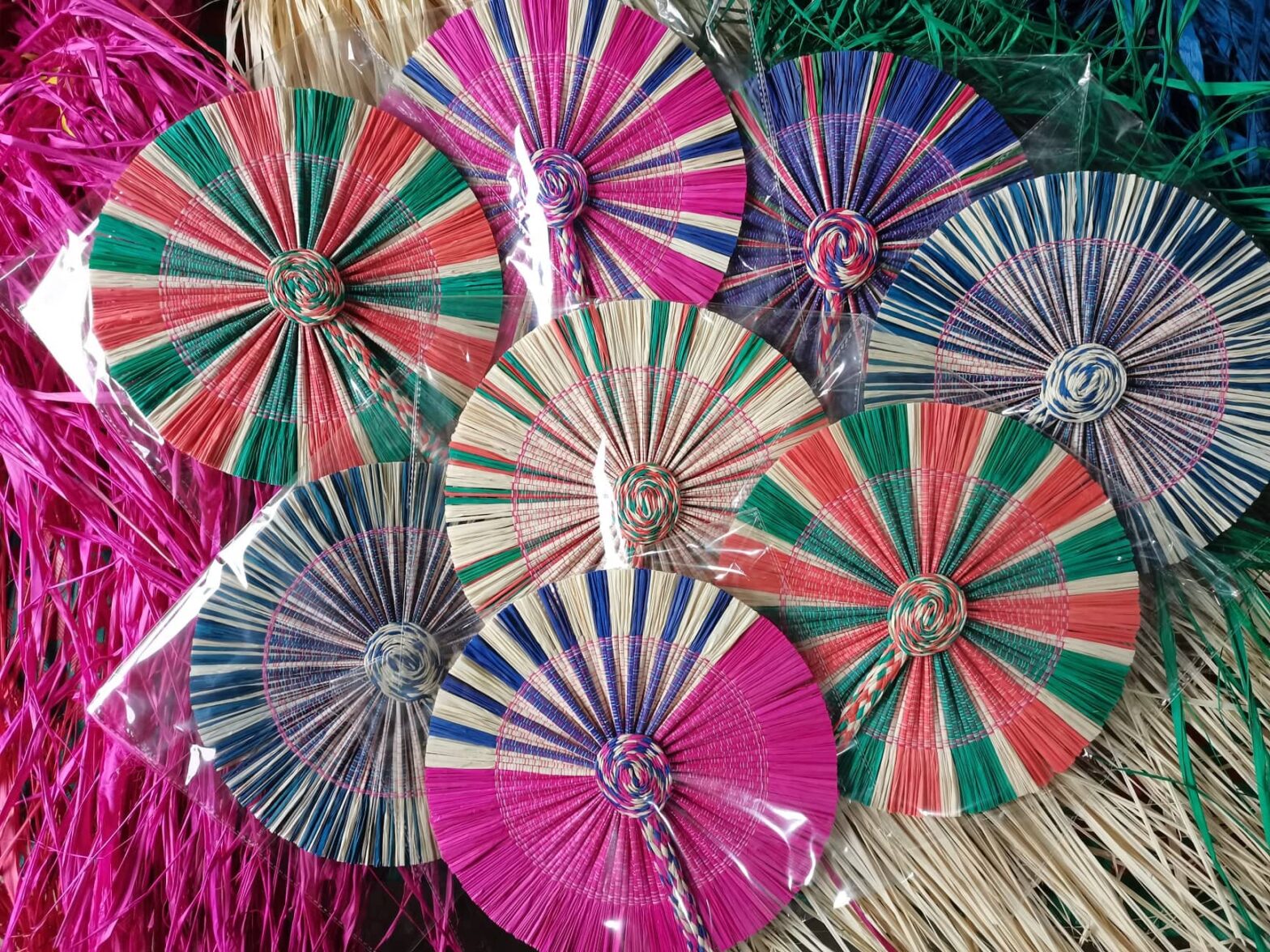
Colorful Buri fans made by housewives
Joy Soriano, founder of Zyrrah's Arts and Crafts, began her passion for local crafts in the 1970s.
“I started trading various handmade Filipino products such as bags and shoes made from northern fabrics, designing my own shoes and bags and offering them to various foreign friends,” she says.
Soriano's passion for Capiz is palpable. “I love Capiz and the products we can make and develop with it. Our country is endowed with abundant raw materials from the sea; Capiz’s versatility makes for very elegant homeware masterpieces.”
For Soriano, her Capiz products also help promote the Philippines as a premium source for quality artisan products.
READ: Traditions Reimagined at Kultura's Filipino Design Studio
Article continues after this ad
Soriano's first buyer was SM's Quiapo office. In 2013, Soriano came across Kultura by chance while attending a famous trade fair. “That was the beginning of our collaboration. After the first order, we were asked to provide samples on a monthly basis. We have always strived to develop products for Kultura.”
Article continues after this ad
Zyrrah's Arts and Crafts products initially supplied five Kultura stores and are now available in 26 stores.
Soriano shares the same vision and values as Kultura. “We are working to contribute to the economy by creating jobs [for] the housewives and housemothers,” she says.
Zyrrah's Arts and Crafts has a pool of 29 regular in-house capiz makers, a team of quality controllers and office staff.
Although it's a low-margin business, Soriano says she's “so happy” to be able to donate to the grassroots. She is working on her dream of “getting more orders and employing more people, especially in the barangays.”
Forty years later, Soriano notes that “the potential of the local market has increased as various high-end department store chains want to carry our product range, particularly the premium Capiz product range.”

Cone trees in white and green made by Zyrrah's Arts and Crafts
Marketplace for local products
What we know today as Kultura began in 2004 as a Filipino handicrafts section at SM Store in Makati.
Twenty years later, this small section of the department store has grown to 45 branches across the country – home to traditional and modern Filipiniana and Barong, authentic South Sea and freshwater pearls, souvenirs, local delicacies, sustainable interiors and natural wellness items – Kultura's expansion has also fueled growth of its suppliers.
“In line with SM Group, we work with micro, small and medium-sized enterprises and provide a bridge between them and our customers. Many of our partners have been with us since the beginning,” says Sheila Tan, senior assistant vice president of operations at Kultura.
These partners, in turn, provide sustainable livelihoods and opportunities that consequently improve the lives of their workers. “We strive to be the home of social enterprises,” adds Tan.
Promoting Filipino culture
Another partner, Cebu-based Hannah's Handicraft, found a market in Kultura through bazaars and fairs under the Ministry of Trade and Industry.
Hannah Anggana, namesake of the craft business and daughter of the founders, oversees the partnership with Kultura. She shares how they invested time, knowledge and training to be able to create beautiful products for the store. “We worked to create products that the market would truly value and Kultura helped us share design trends that are currently in demand,” shares Anggana.
Hannah's Handicrafts and Kultura both have the vision to contribute to the preservation and promotion of Filipino culture while committed to promoting cultural heritage and strengthening the community.
“Kultura helps us and we help the barangays in the mountains,” says Angana.


Different flavors of Kangkong King
Supportive communities
A group of young millennials founded Kangkong King, driven by ambition and innovation. As with all Micro, Small and Medium Enterprises (MSMEs) working with Kultura, their vision was encouraged and supported. “We really want them to expand. We really encourage them to go out and make the most of their brand,” says Kultura’s Tan.
Starting with three employees in 2021, Kangkong King now employs around 70 people. From working in the home kitchen to running his own office and factory, Kangkong King has come a long way in a short period of time.
“An underrated, classic Pinoy appetizer is kangkong,” says Anne Gaw, marketing director of Kangkong King. They bet on the product's potential to become a staple.
Their partnership with Kultura started with a cold email, a strong belief in their products, and knowing who they wanted to work with. Gaw explains why they took the risk of reaching out to Kultura.
“We really thought about where we wanted our product to be placed. We think Kangkong King is very Pinoy. Therefore, one of our goals is for our product to become a staple of Filipino pasalubong. We thought, “Which pasalubong shop is popular here in the Philippines?” There is nothing else. It's Kultura. Locals and foreigners alike know the brand.”
Gaw is happy that Kultura doesn't charge them a listing fee. “This is a great help for us as merchandisers.”
Originally serving 20 stores, Kangkong King is now available in 70 to 75 percent of Kultura stores. Gaw further shares, “With Kultura, we are able to reach Mindanao, Visayas, which was one of our problems in the beginning.”
Gaw observes people's shopping habits in a Kultura store and realizes the appeal of a one-stop pasalubong store and how it works to their advantage. “When people come into Kultura, they really intend to buy. You look around and find something. I think that’s what really sets Kultura apart.”
Like other Kultura partners, Kangkong King also works with a community. “We work with partner farmers in Rizal and Pampanga. When we started this company, we didn't realize the huge impact it would have on their livelihoods. Now we hear that other landowners in the area are converting their land into kangkong farms as they see the opportunity and demand,” says Gaw.
At the top of your mind
In Agdangan, Quezon, a weaving association made up of housewives, created Buri compartments for Kultura. The Mga Likha ni Inay organization supports these housewives in marketing their products.
“We support and help around 1,800 customers directly and indirectly. This includes employees of the customers we serve,” says Aristopher Punzalan, president of Mga Likha ni Inay.
Punzalan says her vision aligns perfectly with Kultura. “For us, our partnership with Kultura is based on introducing our members' products to a larger market, which will later be converted into sales. The focus is really on supporting locals and local products. We have long supported our traditions and our local products and crafts. I think that’s what Kultura wants: to introduce Filipino products to others.”
For Punzalan, it helps that “Kultura is a top priority for Balikbayans and is a one-stop shop for purchasing locally made crafts and food.”
Looking for new talent
Kultura rings in the new year and the brand hopes to become a place for more emerging MSMEs and talent.
“Our goal for next year will be to discover more young designers and new brands and offer our customers even more dynamic shopping experiences,” says Tan.
Kultura welcomes a growing movement to support local products.
“The focus now is on locally made products [products]. Different market segments have recognized the artistry of Filipino artisans and their products are becoming more and more appreciated by locals. Maybe it’s because Millennials and Generation Z are aware of sustainability and are more likely to choose eco-friendly products,” shares Tan.
The small craft shop of 20 years ago is doing what it can to stay true to its vision – a home for social enterprises, aspiring artisans and dreamers.
